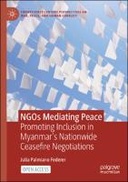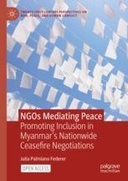Explore

This book explores the role of nongovernmental mediators in promoting “inclusive peace” to negotiating parties in Myanmar’s Nationwide Ceasefire Agreement (NCA) negotiations from 2011-2015. The influx of NGO mediators directly engaging with the negotiating parties and promoting the inclusivity norm coupled with the salience of discourse around “all-inclusiveness” at the end of the NCA process forms a puzzle around the agency that NGO mediators wield in influencing political outcomes, despite their lack of political and material leverage. The author argues that NGO mediators can effectively promote norms, using mediation processes as a site of norm diffusion. Bespoke international conflict resolution NGOs have become key mediation actors, within the last three decades through creating the niche world of “private diplomacy” and acting as "norm entrepreneurs" at the same time. As informal third parties, these NGO mediators directly engage with politically sensitive actors or convene unofficial peace talks. As NGOs, they are part of an epistemic community of mediation practice, professionalizing the field and producing knowledge on what peace mediation is and what it ought to be. This dual identity as both NGOs and mediators nicely sets them up with a unique agency to promote and diffuse norms. These norms often reflect the liberal peacebuilding paradigm promoted from the Global North, such as inclusion, gender equality and transitional justice, with the view that these norms are not ends in themselves but as necessary ingredients for effective mediation. The book further questions whether NGOs should promote norms in the first place. The outcome of the NCA process presents a critical and cautionary tale of promoting a presumed universal norm into a given locale and expecting a certain outcome without understanding how an external norm interacts with existing normative frameworks. The book illustrates that while NGO mediators do possess the “normative agency” to effectively promote norms to negotiating parties, my empirical research analyses how their promotion of the “inclusivity” norm to the negotiating parties in Myanmar’s NCA paradoxically resulted in exclusionary outcomes: only half of the armed groups in the ethnic armed groups’ negotiating bloc signed, and civil society was effectively crowded out from meaningful participation despite lofty rhetoric. This is an open access book.
This book is included in DOAB.
Why read this book? Have your say.
You must be logged in to comment.
Rights Information
Are you the author or publisher of this work? If so, you can claim it as yours by registering as an Unglue.it rights holder.Downloads
This work has been downloaded 82 times via unglue.it ebook links.
- 34 - epub (None) at Unglue.it.
- 29 - pdf (None) at Unglue.it.
Keywords
- agentic constructivism
- Asian security policy
- Conflict resolution
- critical peace research
- diplomacy
- International relations
- Myanmar studies
- ngo
- nongovernmental mediators
- peace mediation
- peace negotiations
- Politics & government
- private diplomacy
- Society & Social Sciences
- thema EDItEUR::J Society and Social Sciences::JP Politics and government::JPS International relations
- thema EDItEUR::J Society and Social Sciences::JP Politics and government::JPS International relations::JPSD Diplomacy
- United Nations
- unofficial peacemaking
Links
DOI: 10.1007/978-3-031-42174-7web: https://link.springer.com/book/10.1007/978-3-031-42174-7
Editions



